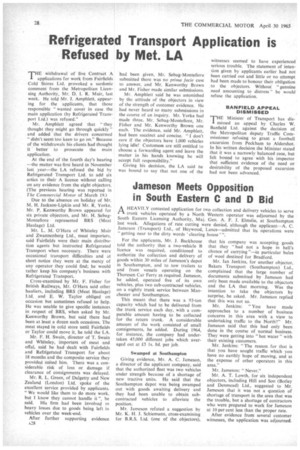Jameson Meets Opposition in South Eastern C and D Bid
Page 30

If you've noticed an error in this article please click here to report it so we can fix it.
A HEAVILY contested application for two collection and delivery vehicles to serve
trunk vehicles operated by a North Western operator was adjourned by the South Eastern Licensing Authority, Maj. Gen. A. F. J. Elmslie, at Southampton last week. Allegations of rate cutting were denied, although the applicant—A. C. Jameson (Transport) Ltd., of Heywood, Lancs—admitted that its operations were "getting near to the dirty words clearing house' ".
For the applicants, Mr. J. Backhouse told the authority that a two-vehicle B licence was required, conditioned to authorize the collection and delivery of goods within 30 miles of Jameson's depot in Southampton, and to tow trailers to and from vessels operating on the Thoresen Car Ferry as required. Jameson, he added, operated five of its own vehicles, plus two sub-contracted vehicles, on a nightly trunk service between Manchester and Southampton.
This meant that there was a 93-ton capacity which had to be delivered from the trunk service each day, with a comparable amount having to be collected for the return trunk. A considerable amount of the work consisted of small consignments, he added. During 1964, for instance, the company had undertaken 45.000 different jobs which averaged out at £5 Is. 8d. per job.
Swamped at Southampton Giving evidence, Mr. A. C. Jameson, a director of the applicant company, said that the authorized fleet was two vehicles under strength because of a shortage of new tractive units. He said that the Southampton depot was being swamped out with goods awaiting delivery and they had been unable to obtain subcontracted vehicles to alleviate the position.
Mr. Jameson refuted a suggestion by Mr. K. H. J. Schiemann, cross-examining for B.R.S. Ltd. (one of the objectors), that his company was accepting goods that they "had not a hope in hell's chance of carrying "—in particular bales of wool destined for Bradford.
Mr. Ian Jenkins, for another objector, Bakers Transport (Southampton) Ltd., complained that the large number of documents submitted by Jameson had only been made available to the objectors and the LA that morning. Was the intention to take the objectors by surprise, he asked. Mr. Jameson replied that this was not so.
Mr. Jenkins: "You have made approaches to a number of business concerns in this area with a view to undertaking traffic to the North?" Mr. Jameson said that this had only been done in the course of normal business. They were getting into "hot water" with their existing customers.
Mr. Jenkins: "The reason for that is that you have sought traffic which you have no earthly hope of moving, and at the expense of other operators in this area."
Mr. Jameson: "Never."
Mr. A. T. Lowth, for six independent objectors, including Hill and Son (Botley and Denmead) Ltd., suggested to Mr. Jameson that it was not a question of shortage of transport in the area that was the trouble, but a shortage of contractors who were prepared to work for Jameson at 10 per cent less than the proper rate.
After evidence from several customer witnesses, the application was. adjourned.




































































































